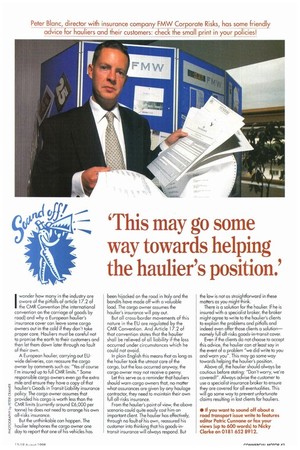Peter Blanc, director with insurance company FMW Corporate Risks, has
Page 45

If you've noticed an error in this article please click here to report it so we can fix it.
some friendly advice for hauliers and their customers: check the small print in your policies!
'This may go some way towards helping the haulier's position.'
Iwonder how many in the industry are aware of the pitfalls of article 17.2 of the CMR Convention (the international convention on the carriage of goods by road} and why a European haulier's insurance cover can leave some cargo owners out in the cold if they don't take proper care. Hauliers must be careful not to promise the earth to their customers and then let them down later through no fault of their own.
A European haulier, carrying out Ellwide deliveries, can reassure the cargo owner by comments such as: "Yes of course I'm insured up to full CMR limits." Some responsible cargo owners even go the extra mile and ensure they have a copy of that haulier's Goods in Transit Liability insurance policy. The cargo owner assumes that provided his cargo is worth less than the CMR limits (currently around £6,000 per tonne) he does not need to arrange his own all-risks insurance.
But the unthinkable can happen. The haulier telephones the cargo owner one day to report that one of his vehicles has been hijacked on the rood in Italy and the bandits have made off with a valuable load. The cargo owner assumes the haulier's insurance will pay out.
But all cross-border movements of this nature in the EU are regulated by the CMR Convention. And Article 17.2 of that convention states that the haulier shall be relieved of all liability if the loss occurred under circumstances which he could not avoid.
In plain English this means that as long as the haulier took the utmost care of the cargo, but the loss occurred anyway, the cargo owner may not receive a penny. Let this serve as a reminder that hauliers should warn cargo owners that, no matter what assurances are given by any haulage contractor, they need to maintain their own full all-risks insurance.
From the haulier's point of view, the above scenario could quite easily cost him an important client. The houlier has effectively, through no fault of his own, reassured his customer into thinking that his goods-intransit insurance will always respond. But the law is not as straightforward in these matters as you might think. There is a solution for the haulier. If he is insured with a specialist broker, the broker might agree to write to the haulier's clients to explain the problems and pitfalls and indeed even offer those clients a solution— namely full all risks goods-in-transit cover. Even if the clients do not choose to accept this advice, the haulier can at least say in the event of a problem "we did write to you and warn you". This may go some way towards helping the haulier's position. Above all, the haulier should always be cautious before stating: "Don't worry, we're covered!". Always advise the customer to use a specialist insurance broker to ensure they are covered for all eventualities. This will go some way to prevent unfortunate claims resulting in lost clients for hauliers.
• If you want to sound off about a road transport issue write to features editor Patric Cunnane or fax your views (up to 600 words) to Nick,/ Clarke on 0181 652 8912.




































































































